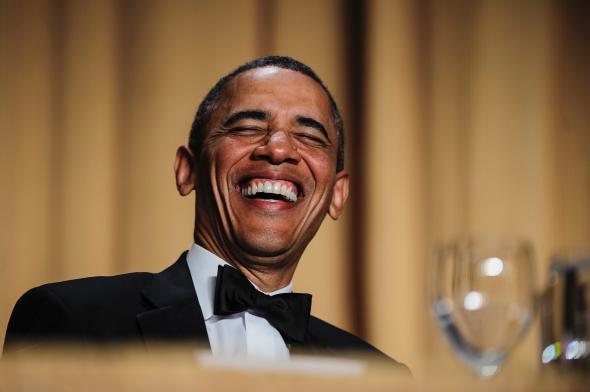From #NerdProm to Hairshirts

Photo by Pete Marovich-Pool/Getty Images
By no means do I claim to have my finger on the pulse of the D.C. party scene. I've hung around long enough to be invited to some events around the annual White House Correspondents' Association Dinner, but don't throw elbows to get invited into the exclusive parties. Still, this Hollywood Reporter story on why fewer celebrities have lowered themselves to attend the dinner—actually a weekend of events—rings true.
According to [an anonymous] source, "there are way too many A-listers who have had pretty weird experiences at the dinner. A lot of the people who have gone say they'll never do it again. The room is so crowded. It's uncontrolled. There's no limit to the number of people trying to get photos and autographs -- and there's no way to hide from it. It's like the stars are animals in a cage. People go crazy when they see them. They act like a bunch of kids at the Kids' Choice Awards."
Publicists warn their clients that it's ok to attend the dinner -- especially if they want publicity for a project -- but to beware. This is a crowd that gropes and grabs. A few years ago, one drunken guest actually bared her breasts to Ben Affleck as he was walking to the men's restroom. (That was the last time he attended the dinner.) And it's not just the megastars who get the unwanted attention, which often comes from the dates of the correspondents.
"They're infatuated with anyone who is sort of famous," according to one previous attendee.
All that's missing here is a sense of who attends the parties, and why celebrities would want to come at all. Plenty of journalists, more than would likely admit it, show up, but they are matched or outmatched by PR flacks. The celebrity who parachutes in, if he or she is not aggressively handled by a sponsor or flack, is constantly at danger of falling into the worst conversation imaginable, to be followed by a selfie request.
As an MSNBC talking head of sorts since 2010, I typically end up at the network's party and have noticed some celebrities showing up—they do like MSNBC, after all—but making it clear they want to talk to no one new. I remember, from last year, standing near Ian McKellan, Dustin Lance Black, and the actor who plays Artie on Glee having a conversation in a tight circle with a barrier of chairs and a table of Absolut cocktails between them and gawking fans. It didn't seem fun, for anyone. (A reporter friend had previously told me that McKellan and Patrick Stewart politely declined all photo requests because they didn't want to spend the whole night fulfilling them.)
The feeling is ... well, not mutual, exactly, but increasingly popular. Since its founding in 2007, Politico has churned out a special issue and stream of online content that covers the dinner. It's doing so again this year, with prose that contains small traces of acid between the boldfaced names ("Claire Shipman and Katty Kay’s book, “The Confidence Code” was given out, right next to a giant ice sculpture for “Story Partners D.C.” which fell over and crashed toward the end of the night after an afternoon in the sun"), but it's overshadowed by a big feature on how White House reporters despise what their beat has become. Patrick Gavin, Politico's longtime celebrity/journalism reporter, is leaving the publication to make a documentary about the farce of the dinner.
What caused all this? I'll spitball about a few factors.
- This Town. Mark Leibovich's 2013 study of D.C. rottenness was criticized for "pulling punches." No one fled the city in disgrace because of it, which might have led to the impression that Leibovich was overly soft. He wasn't—the book had a delayed shaming effect. Plenty of people recoiled in horror when Politico tried to pre-empt the book with a piece about how Washington would react to it—a piece full of boldface-naming and anonymous-quoting and the strange insistence that Tammy Haddad's annual brunch is an important event. The book spent 12 weeks on the NYT best-seller list, and it absolutely has restored a little shame where shame had been forgotten.
- Selfies. Well, cameras in general. As recently as 2007, celebrities could attend D.C. parties without every single person having a decent camera phone. As recently as 2011, they could be confident, at least, that the photos they posed for would maybe show up on Facebook or something, but not be broadcast everywhere. Come 2013, when everyone was immediately tweeting and instagramming them, it must have gotten insufferable. True, as THR reports, last year celebrities were fresh off a campaign in which they'd donated to President Obama and a lot of Democrats, and the feelings have faded. But social media has surely made the experience more irritating for them. (Apocryphal story sidebar: The most recent year Sean Penn showed up, he spotted someone ogling him and taking an iPhone photo, and he grabbed the device and tossed it into the distance.)
And there are more reasons, from the aforementioned angst about the beat being celebrated to the unchecked growth of younger, snarkier media that shames this tradition. It's not about to go extinct or anything, but the usual cycle of shame/giving in to reckless partying/shame is being tested.
